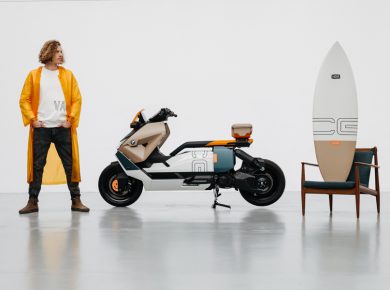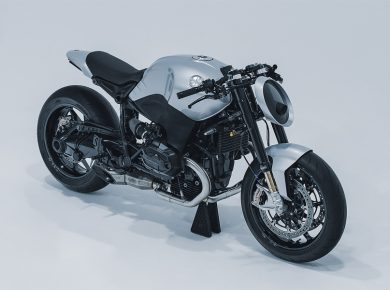
BMW Motorrad has revealed its Vision CE concept, an electric scooter that rethinks how two-wheeled urban mobility can look and feel. At the heart of the project is a safety cell built from a metal tube frame that encloses the rider and integrates a seatbelt system, eliminating the need for a helmet or heavy protective clothing. The design recalls the earlier BMW C1 scooter from more than two decades ago but adapts the idea to modern electric platforms, lightweight engineering, and contemporary expectations for comfort and style.

The scooter’s matte white bodywork contrasts with black structural elements, accented with touches of neon and exposed aluminum to emphasize both minimalism and a futuristic edge. Its stretched wheelbase and low stance give it a solid, planted presence while still feeling open and airy thanks to the cage’s transparent geometry. Inside, the seat has been shaped for ergonomics and subtle branding, aiming to make the ride both casual and secure.

Practical details add to its urban appeal. A self-balancing function keeps the scooter upright when stationary, removing the need to put feet on the ground at stoplights and giving confidence to less experienced riders. By avoiding the need for helmets and heavy jackets, BMW intends to make the act of riding quicker and more spontaneous, encouraging people to use the scooter as a simple extension of daily life without a long preparation ritual.

The Vision CE is still a concept but is based on the proven CE 04 platform, which offers around 42 horsepower and a range of up to 130 kilometers. This foundation ensures the concept is more than just a design exercise, as the underlying mechanics are already tested in real-world urban use. While no production plans have been confirmed, the Vision CE represents BMW’s ambition to make electric two-wheelers more approachable by removing barriers of safety gear, balancing performance with ease of use, and turning everyday commuting into something that feels as natural as slipping into a car.



